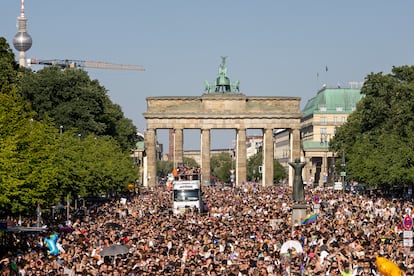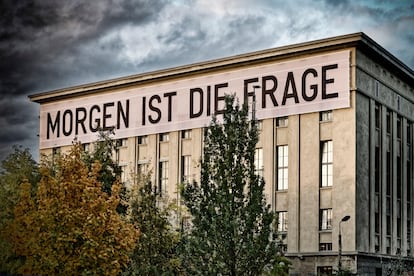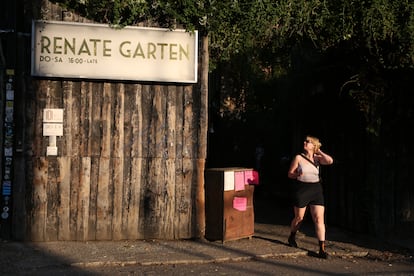Berlin’s techno clubs, from euphoria after the fall of the Wall to today’s cultural heritage
The recent inclusion of these electronic music festivals on the UNESCO list has reinforced the German capital’s image as a symbol of freedom


Freedom, pure energy, equality, and respect. These are just some of the words that commonly come up when you ask a Berliner about the techno club culture in Germany’s capital. This special culture that turned the city into a mecca for techno music fans will now be protected by UNESCO after being included a few days ago on its list of intangible cultural heritage.
“The first thing that makes Berlin club culture special is that there are no time restrictions, at least in general. This means that there are many of them, and they have a lot of freedom,” explains DJ Laurine about one of the main features of the electronic scene in the German capital. “Politically speaking, a culture is allowed to exist here. At the end of the day, that is the essence of everything.”
DJ Laurine, a native of Italy who settled in Berlin 15 years ago, now plays in such famous clubs as the Berghain and is the co-founder of the Slow Life label. For her, club culture means “freedom of expression” above all. She came one weekend on vacation and immediately saw that it was her place. “I realized that everything I needed to be happy was here.”

While in other parts of Europe it is normal for clubs to close at six in the morning, after which time people have to go to the so-called after parties, in Berlin there has been no closing time since 1949. That year, after a tug-of-war between East and West Berlin over the curfew, a hotelier named Heinz Zellermayer managed to convince the Allies to lift the restriction. When the Wall fell in 1989, East Berlin also adopted this measure.
Adding to the lack of closing times was the fall of the Berlin Wall and the fact that the police had other more important things to deal with in the 1990s. In this breeding ground, a unique cultural scene was born that knew how to occupy the numerous empty spaces left in the city.
“Techno became the soundtrack of the spirit of optimism after reunification,” UNESCO argued when it declared this culture a form of intangible heritage. This followed a petition presented in 2021 by Rave the Planet, a collective of DJs led by Dr. Motte. The famous DJ from Berlin is one of the creators of the legendary Love Parade, which in the 1990s brought together more than a million people to the rhythm of techno.
Berlin is not the only place where techno culture originated. Its roots are found in locations as diverse as Detroit, Chicago and Belgium, and in early electronic music genres such as electronic body music, synth-pop and new beat. But its peculiarities made it unique, with DJs such as Tanith, Clé, Kid Paul, Marc Reeder, Cosmic Baby, Ellen Allien, Mike Banks, Robert Hood. “A kind of utopia was created, that is, a place where it doesn’t matter where you come from, what your sexuality is, your skin color, or your religion,” explains Alexander Krüger, organizer of the FEEL festival, in the video that accompanied the petition.

“Berlin would lose something absolutely huge if this stopped happening,” adds Dimitri Hegemann, founder of the Tresor club. Opened in 1991, it is one of the most famous techno clubs in the world. “This is the place where everyone comes. The entire industry is here, with acts such as Resident Advisor, Ableton, Native Instruments, Beatport. If you want to be an actor, go to Hollywood, if you want to be a DJ, go to Berlin,” says DJ Alan Oldham.
Techno culture in Berlin is not only a specific musical style, but also includes artistic expressions and the famous raves, clandestine electronic music parties, which for years were held across the entire center of the city and that have currently moved to the outskirts. From the beginning, techno united people of all ages and without distinctions. It defined an entire era.
“Berlin’s club culture had a very strong influence on me. I was lucky to be a teenager in the nineties,” remembers Paul Frick, a DJ and musician with Brandt Brauer Frick, and Tangerine Dream for a couple of years.
“I went to places like Tresor or WMF, clubs that I thought were impressive and that introduced me to the music and the people,” he says about two legendary places from the 1990s. “In retrospect, of course, the exciting thing about that time was the anarchy. The fact that Berlin was not very regulated because the authorities had much bigger problems to deal with,” the Berlin musician adds.
He also remembers the illegal parties he had with his friends on the banks of the Spree River — something that would be impossible today. “That era has passed, of course, but Berlin still has a very rich and diverse club culture, with a lot to offer to different people.”
The list of clubs remains endless — despite the fact that many closed their doors due, above all, to the gentrification that Berlin has undergone in recent years — with some as popular as About Blank, Sisyphos, Kater Blau, Watergate, Club der Visionaere, Else, Hoppetosse, Zenner, Golden Gate, Wilde Renate, and the legendary Tersor, KitKatClub, and Berghain, to name just a few. There are club nights which cater for all tastes, and which change depending on the time and the day. You can go to dinner with some friends and then go dancing or meet for breakfast on a Sunday and then go to a club to listen to electronic music starting at 10 a.m.
The club nights and imagination have no limits in Berlin, which also has a strict no-photo policy. For example, the Wilde Renate hosts the House of Lunacy every two months, a sex positive party with a theme each time and a strict dress code. Along the same lines, although it is only for men, is the Lab.oratory, in the Berghain.
This club located in a former power plant is famous for having one of the best sound systems in the world. The best DJs in the world play there. This turned the Berghain into the temple of electronic music and one of the great magnets of so-called “electronic tourism.” If it’s sometimes difficult to get into a club, trying to understand the Berghain’s esoteric door policy has become something like trying to navigate a Greek labyrinth. There may be many failed attempts before you can enter. Celebrities are not the exception either. Additionally, an Instagram account tells you the current wait time, which can easily top five hours or more.
But for Berlin to remain Berlin, electronic music and club culture must be protected from real estate developers. That is why UNESCO’s decision was described by the Berlin club network Clubcommission as “a milestone.” “At the moment it is not entirely clear, but in the medium and long term it will serve to increase funding and have more possibilities to protect clubs from exclusion or in licensing procedures,” explains Lutz Leichsenring. The executive member of the Clubcommission board recalls the fact that they have already achieved things such as being recognized by the German Parliament as “cultural facilities.”
Leichsenring recognizes that urban pressure takes its toll on clubs. “The situation was and is very tense due to the construction of the A100 motorway,” he says about a controversial expansion project that would close dozens of clubs, including About Blank or Wilde Renate.
No one can stop the transformation of a city that is growing every year and where prices have risen relentlessly compared to more than 10 years ago when Berlin was, as its mayor at the time said, “poor, but sexy.” However, as DJ Laurine points out, “it has clearly changed, but it is still the only city in the world where you can experience such a unique electronic scene.”
Sign up for our weekly newsletter to get more English-language news coverage from EL PAÍS USA Edition
Tu suscripción se está usando en otro dispositivo
¿Quieres añadir otro usuario a tu suscripción?
Si continúas leyendo en este dispositivo, no se podrá leer en el otro.
FlechaTu suscripción se está usando en otro dispositivo y solo puedes acceder a EL PAÍS desde un dispositivo a la vez.
Si quieres compartir tu cuenta, cambia tu suscripción a la modalidad Premium, así podrás añadir otro usuario. Cada uno accederá con su propia cuenta de email, lo que os permitirá personalizar vuestra experiencia en EL PAÍS.
¿Tienes una suscripción de empresa? Accede aquí para contratar más cuentas.
En el caso de no saber quién está usando tu cuenta, te recomendamos cambiar tu contraseña aquí.
Si decides continuar compartiendo tu cuenta, este mensaje se mostrará en tu dispositivo y en el de la otra persona que está usando tu cuenta de forma indefinida, afectando a tu experiencia de lectura. Puedes consultar aquí los términos y condiciones de la suscripción digital.








































